ASTANA – On international day of United Nations (UN) peacekeepers observed on May 29, The Astana Times interviewed members of the Kazakh contingent to tell their stories on what it means to be a peacekeeper. What follows are some insightful and candid responses detailing their daily routine, the lessons learnt and first-hand stories of the challenges and rewards of peacekeeping.
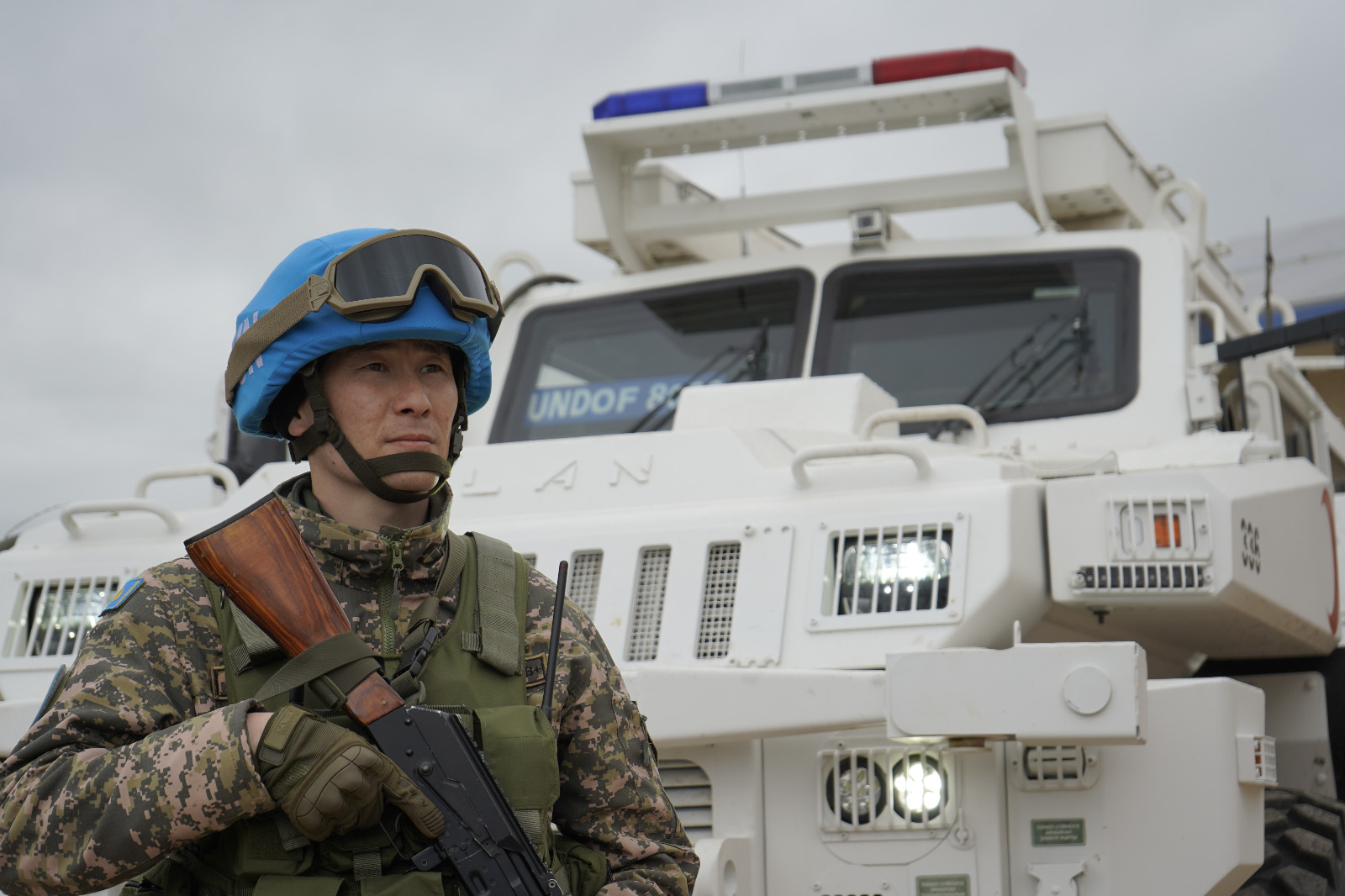
Senior sergeant Yerbosyn Tolymbek. Photo supplied by author.
UN peacekeeping is part of a global commitment to international peace and security, and for the first time this year, Kazakhstan has sent an independent peacekeeping group to the Golan Heights as part of the UN mission and became a proud contributor to this cause. Earlier this year, a plane carrying 139 military personnel arrived in Damascus, tasked with monitoring the ceasefire between Israel and Syria.
Senior sergeant Yerbosyn Tolymbek, aged 32, who previously served in Lebanon under the command of the peacekeeping battalion of the Indian Armed Forces, shared his motivations for becoming a peacekeeper, having gravitated toward the opportunity to put his skills to work.
“Since 2018, a peacekeeping mission has been available in our country. At the time when the first rotation was assembled, the men who served with me were leaving. I saw this as an opportunity to travel abroad, to learn a new language, and to demonstrate the skills of our profession that we have mastered for many years in our country and through valuable exchange with other countries,” said Tolymbek.
For this mission, the Kazakh contingent underwent a six-month training conducted by KAZCENT in accordance with the UN rules and requirements for integration and interoperability in multinational peacekeeping operations.
Tolymbek’s daily routine is now markedly busy. Every day, he wakes up at 6 a.m., exercises, attends briefings on the local situation, and goes on patrol duties.
It is clear that peacekeepers have taken certain risks. “We know what dangers our mission involves. But because this is my second mission, there is much less fear,” said Tolymbek.
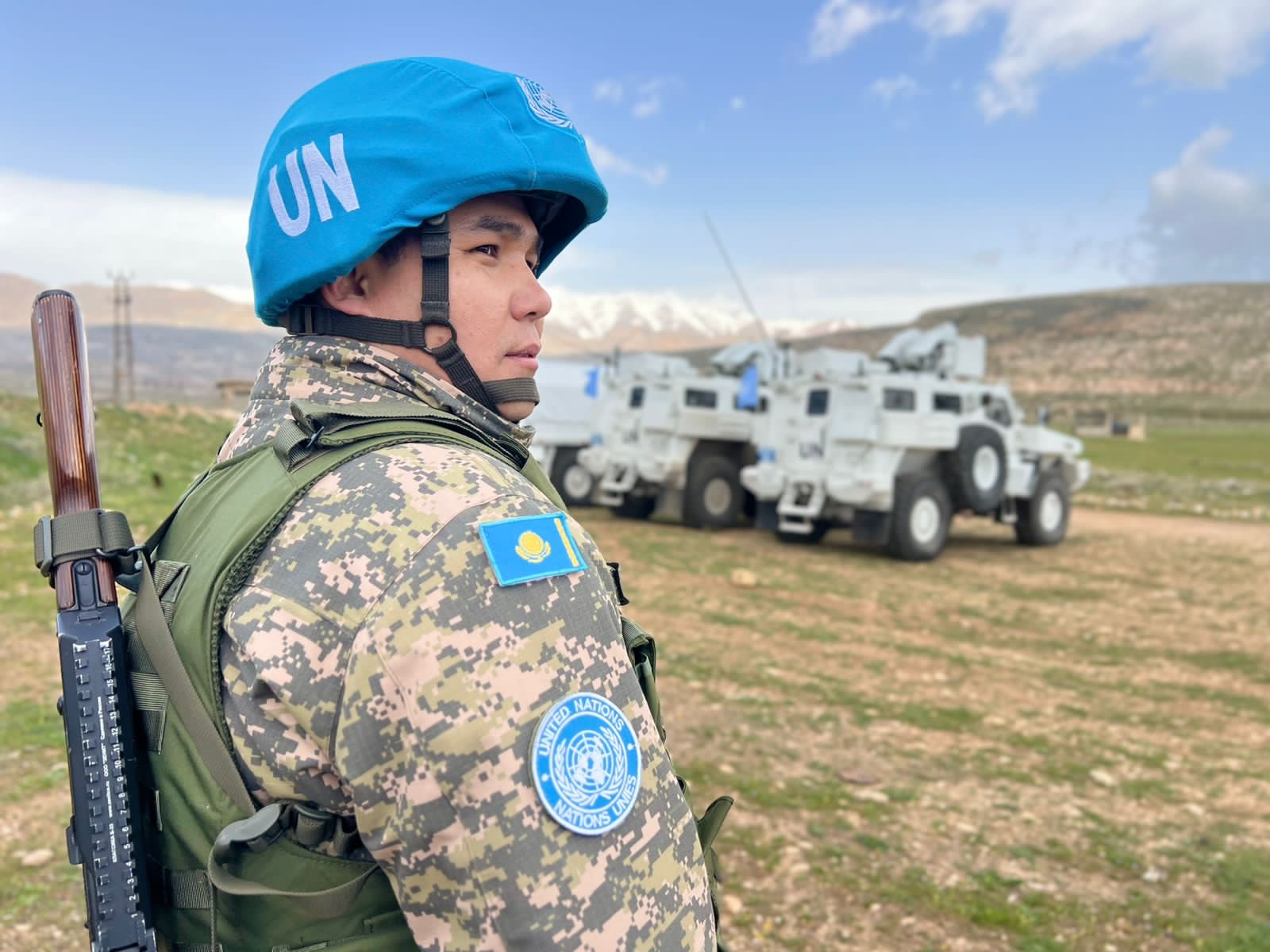
Talgat Yelibaev is a senior sapper in an engineering sapper platoon. Photo supplied by the author.
The hardest moments, he said, are those when he is unable to assist the people living in the country, especially families, women, and children enduring difficult conditions.
“This country has been through a war and is now in the process of recovery. One of the most memorable moments for me was during a mobile patrol. When we conduct these patrols by car, we strictly adhere to the assigned route. Our task is to observe, take pictures, and report back to the commander. As we approach the refugee camps during these patrols, children and their families often try to stop our car and ask for food. It is a heart-wrenching moment because, as peacekeepers, we are not authorized to provide aid directly. They can only be helped by specialized organizations like the Red Cross,” said Tolymbek reflecting on one stand-out memory.
“Seeing these people, especially the children, witnessing the conditions they live in truly breaks your heart,” he added.
Appreciating that children can grow up under peaceful skies is one of the key lessons gained from witnessing these situations, said Tolymbek.
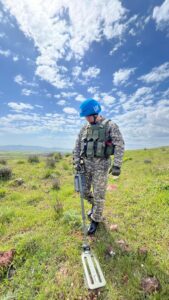
Yelibaev confronts the danger of being a sapper with unwavering diligence. Photo supplied by the author.
“Kazakhstan is a country that has not suffered the ravages of war. That’s why we should appreciate the ‘gold’ that we have here and learn from it. We should be grateful for our circumstances because we have everything we need and can provide everything for our children. I am truly thankful for this,” he said.
Talgat Yelibaev is a senior sapper in an engineering sapper platoon who joined the mission to put into practice the experience he had gained over the years in Kazakhstan. “I also wanted to contribute to peace,” he added.
As a sapper, his main duty is to clear the mines. Yelibaev confronts the danger and responsibility of his duty with unwavering diligence.
“We receive a plan for a week from the UN. Every day starts with waking up at 6 a.m., exercising, and having breakfast. After that, I take orders from the platoon commander and we continue to work like that. This is how our daily life goes,” said Yelibaev.
As a professional military man, Yelibaev balances his personal hobby with doing what duty demands. In his free time, he enjoys capturing everyday moments of his fellow soldiers and sharing them on social media.
“I receive many comments. The majority of them are from people who are also happy and proud about Kazakhstan’s first independent mission,” he said.
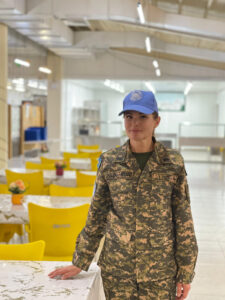
The third-class sergeant Yelena Tsoy. Photo supplied by author
“My most memorable moment was when I arrived in Syrian territory from Kazakhstan. When we disembarked from the military plane, I felt that the environment was different, that it was a different country, and that whole situation was memorable for me,” said Yelibaev.
Women peacekeepers are also fully involved in all efforts to maintain peace and security.
Yelena Tsoy, a third-class sergeant, has been in the armed forces for 25 years. In the mission, she holds the position of a cook.
“My day starts with making breakfast for the personnel and continues with mostly cooking and physical training,” she said.
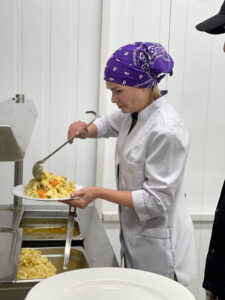
Ensuring that the military personnel is well-fed is Tsoy’s contribution to the mission. Photo supplied by author.
“Kazakhstan contributes to global peace efforts through diplomacy, participation in peacekeeping missions and cooperation with international organizations, and the search for peaceful solutions to conflicts. My contribution is to ensure that our personnel are well-fed and satisfied while on combat duty. As they say, ‘war is war, but lunch is always on time,’” said Tsoy, reflecting on her contribution to the mission.
What she values most in her service is the sense of unity among people from various countries. “We are all multilingual and multinational, but we’re all doing the same job,” she said.
Among the most valuable lessons and qualities, Tsoy listed the exchange of experience with other soldiers from different countries, understanding the diversity of cultures and points of view, as well as self-discipline and endurance.

